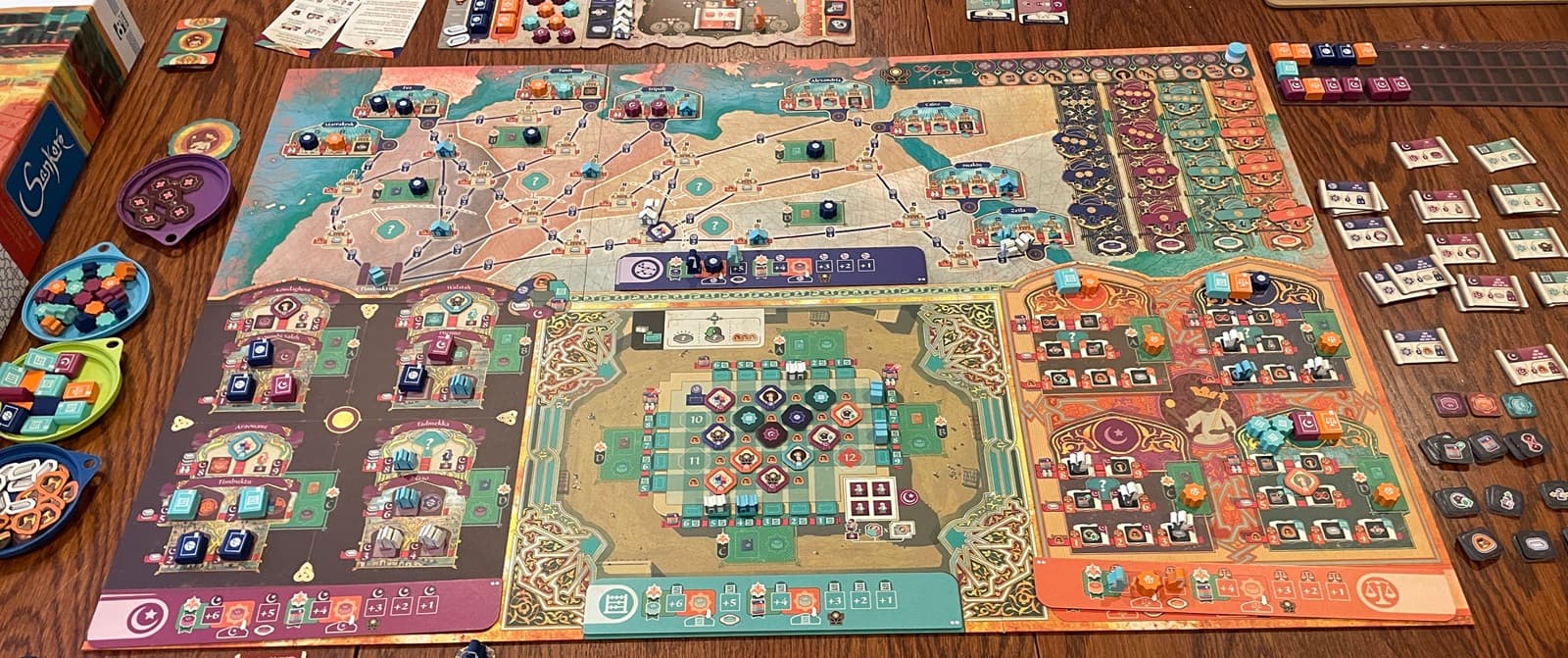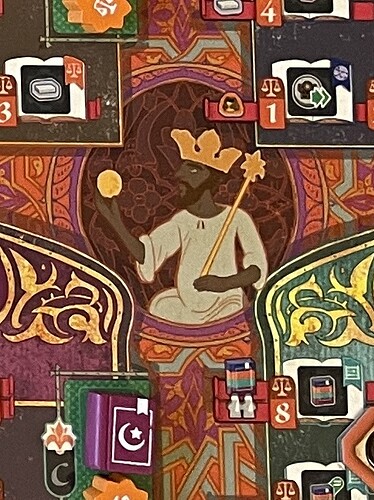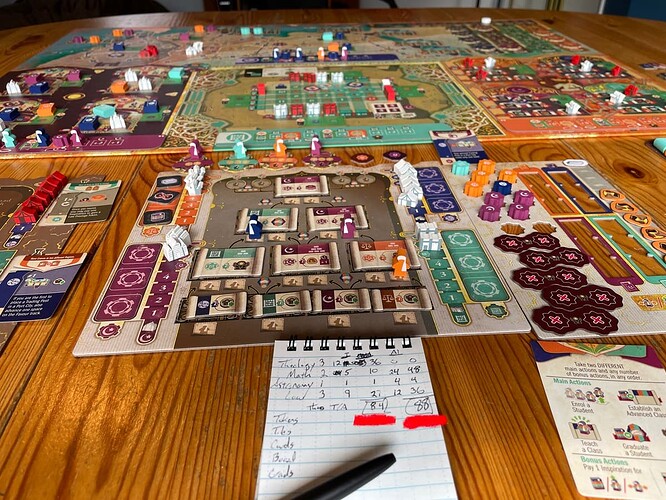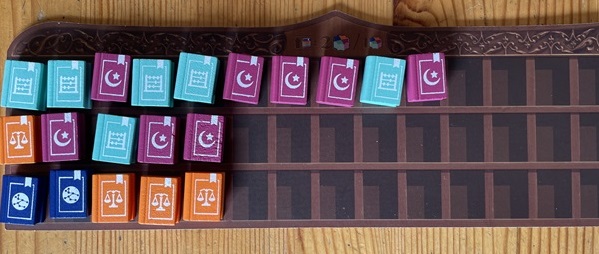For a guy who talks such a big game about being utterly uninterested in new boardgames, I am ashamed to admit that I just caved and bought a new game called Sankore. It grabbed my attention for two (2!) reasons. The first…
I mean, look at that!
If you look at that picture and think “uhhh…heavy Euro?” then you’re right. But if you’re like me, you look at that picture and are immediately mesmerized by the palette, the detail, and the promise of all those icons and pieces. That’s Ian O’Toole for you, who’s pretty famous for boardgame artwork. I look at that and want to be drawn into the exotic sunny embrace of, well, whatever is going on there.
Sankore is one of those games that’s impossible to make sense of at first glance, but with a little thematic assist, you start to see through the detail, into the design. And once you learn the rules, it’s one of those boards that tells you everything you need to know, so just throw the rulesbook back in the box. I learned Sankore by reading through the rules, then setting up a solitaire game, at which point…well, first let me tell you the second reason I bought Sankore: for its solitaire.
The solitaire game isn’t just some automaton deck of cards, as is fashionable with most games that boast solitaire play (I have very strong opinions about the state of solitaire gaming these days, and they are NOT kind!). Instead, it’s a more holistic approach to model the arc of a typical game. It divides the automaton player’s actions into three discrete stages, each with different rules for how to proceed, each modeling the specifics of a typical early-, mid-, and late-game move.
I have no idea how well it works, but I’m fascinated by this approach, and it’s the main reason I decided to buy this game! If it’s doing something unique with its solitaire bot – this is NOT a solitaire game, to be sure, but a multiplayer game with an included solitaire bot – then I want to find out. Also, this is a game by a relative newcomer named Fabio Lopiano who’s got a number of credits under his belt already, so let’s see what kind of work he does.
Anyway, entranced by the artwork, lured by the promise of a unique solitaire bot, I got it set up and I sat down to make my first move. This is a game about running a madrasa in the 1300s in the city of Timbuktu, in the kingdom of Mali, under the fabulously wealthy king Mansa Musa. Your player board represents a curriculum of classes you run students through, and as the students learn and advance through your madrasa, they put into practice their lessons to put your pieces on the board and change the board state in your favor. Your astronomy students learn to finance trade caravans to secure salt from oases and trade with port cities. Your theology students assist distant madrasas to bring manuscripts to the Timbuktu library, which will determine scoring. Your mathematics students erect walls that are the game’s timer. And your law students improve all your other actions by adorning them with various bonuses, basically threading political power into the other disciplines.
What I probably most like about the design is how it begins completely open-ended: the game clock and scoring are completely up in the air. You have no idea how long the game will go, and you have no idea what will score points (it reminds me of one of my favorite boardgames, Archipelago). Instead, the game end and scoring criteria are determined as the board progresses and changes, as students take classes and graduate, as the great library at Timbuktu collects manuscripts, as the caravans fan out across Africa, as walls spring up around the city, and as legal scholars build up a rich tradition of special privileges. It’s all heady stuff, meticulously interconnected, and believe it or not, it bubbles up clear as a mountain spring from all that lovely detailed artwork and iconography.
So anyway, I’m sitting down to take my first move and I realize that I have no idea what to do. I mean, I know the rules, and I know how to make things happen, and I know why they’ll happen. But Sankore is one of those games that’s just so vast and sandboxy, even though it gives each player four very specific objectives to chase. I guess I should do one of those. But which one???
This is how many heavy Euros go, and in that regard, Sankore might feel familiar. It can seem utterly inscrutable at first, even when you know the rules, even when the board is clear as day, even when you’ve wrapped your head around its economy. If you’ve ever bellied up to a Vital Lacerda game, you’ll know the feeling. So…where to start?
I was paralyzed.
I needed someone else to be paralyzed with me. So my friend with whom I’ve been playing Apocrypha offered to play Sankore instead (i.e. I talked her into it). She’s as entranced as I am by boards like this, and I wanted to flex my voice to see if I could manage a teach. I lost my voice completely for a few weeks recently and to my immense relief, it’s come back. So we got through a teach, which was a lot easier than I imagined! Sankore might look complicated, but it’s not that hard to teach thanks to the excellent iconography and “interface”.
So we got a game underway, each of us kind of feeling our way blindly into this exotic sunny sandbox, bumping into each other, stumbling over one another’s caravans, interrupting each other’s legal scholarship, sometimes stealing books out from under one another, but also doing plenty of “multiplayer solitaire”, and generally giving the game shape, gradually putting the clock and scoring into focus. We didn’t finish the game because near the end it was obvious that one of us had managed a blow-out in terms of scoring. But it was a great way to see how the machine worked, to push buttons and pull levers and watch our madrasas process students and effect changes on the board.
And I think now I might – might! – be ready to give this a try solitaire.
By the way, a third thing I really like about Sankore is the subject matter. Running a 14th century North African madrasa, furthering human knowledge and advancing civilization while a diminished Europe waits out the Dark Ages? Sign me up! Garphill’s South Tigris trilogy about Baghdad is about similar subject matter, and this reminds me a lot of Wayfarers of the South Tigris and especially Scholars of the South Tigris. Sankore is considerably heavier than Wayfarers, and it actually overlaps a lot with Scholars, at least thematically, with its emphasis on collecting manuscripts. Sankore also feels a lot more serious to me, mainly because I really dislike Miho Dimitrievski’s webcomic artwork in the Garphill games. Sankore, on the other hand, seems to take seriously the Islamic prohibition against human likenesses with the single exception of a drawing of Mansa Musa:
I was curious how such a drawing even exists, so I looked it up. That image is from a Jewish cartographer’s map!
Another nifty touch that isn’t documented is the student meeples have their turbans untied and hanging down to their shoulders. Here are a couple of students loitering around class:
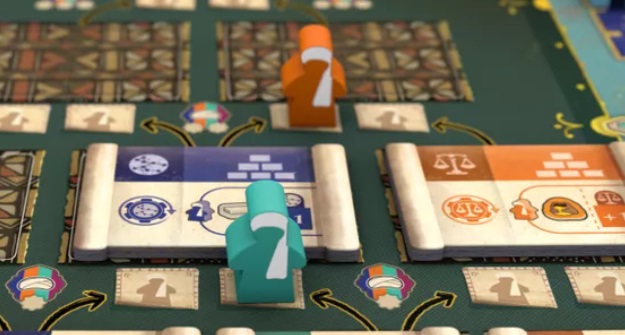
What look like neckties hanging down from their shoulders are actually untied turbans. Which explains why this is the icon for when you graduate a student:
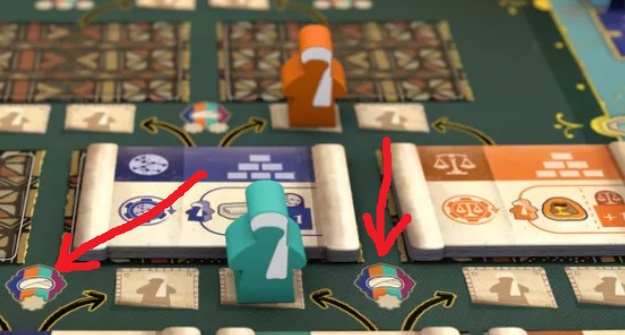
Not sure if you can see, but it’s a multicolored background – any type of student – with a turban in front:
![]()
Because when students graduate, they get to finally tie up their turbans! I love little touches like these in a boardgame.
Anyway, now to try solitaire and see how this weird new three-act structure works. I’ll report back later!
